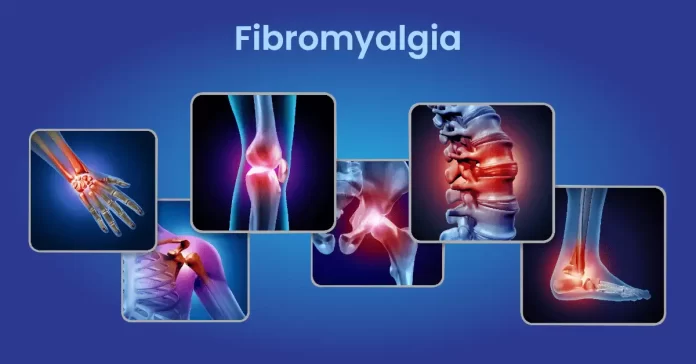Fibromyalgia is a chronic disorder characterized by widespread musculoskeletal pain, fatigue, sleep disturbances, and mood issues. It is considered a syndrome rather than a disease because it involves a cluster of symptoms that tend to occur together. It affects approximately 2-4% of the population, with women being more commonly affected than men. While the exact cause is unknown, it is believed to involve a combination of genetic, environmental, and psychological factors.
Symptoms
- Widespread Pain: The hallmark symptom is chronic, widespread pain that affects various parts of the body, including muscles, joints, and soft tissues. The pain may be described as dull, aching, or burning and is often accompanied by tenderness.
- Fatigue: Many individuals with fibromyalgia experience profound fatigue, even after adequate rest or sleep. This fatigue can interfere with daily activities and contribute to overall feelings of exhaustion.
- Sleep Disturbances: Sleep problems are common in fibromyalgia, including difficulty falling asleep, staying asleep, and waking up feeling unrefreshed. Sleep disturbances can exacerbate pain and fatigue.
- Cognitive Issues: Some people with fibromyalgia experience cognitive difficulties, often referred to as “fibro fog.” This may include problems with memory, concentration, and mental clarity.
- Other Symptoms: Additional symptoms may include headaches, irritable bowel syndrome (IBS), temporomandibular joint (TMJ) disorders, anxiety, depression, and heightened sensitivity to stimuli such as light, noise, and temperature changes.
Causes
The exact cause of fibromyalgia is unknown, but several factors may contribute to its development, including:
- Genetics: There appears to be a genetic predisposition of it , as it tends to run in families.
- Abnormal Pain Processing: People with fibromyalgia may have abnormalities in how their central nervous system processes pain signals, leading to heightened sensitivity to pain.
- Physical or Emotional Trauma: Traumatic events, such as car accidents or emotional stress, have been associated with the onset of fibromyalgia in some individuals.
- Infections: Certain infections may trigger or exacerbate fibromyalgia symptoms in susceptible individuals.
- Other Factors: Factors such as hormonal imbalances, neurotransmitter abnormalities, and lifestyle factors may also play a role in the development of fibromyalgia.
Treatment
While there is no cure for fibromyalgia, treatment aims to manage symptoms and improve quality of life. Treatment approaches may include:
- Medications: Pain relievers, antidepressants, anticonvulsants, and muscle relaxants may be prescribed to manage pain, improve sleep, and address mood symptoms.
- Therapy: Cognitive-behavioral therapy (CBT) and other forms of psychotherapy can help individuals develop coping strategies, improve sleep habits, and manage stress.
- Lifestyle Changes: Regular exercise, stress management techniques, and establishing healthy sleep habits can help reduce symptoms and improve overall well-being.
- Alternative Therapies: Some people find relief from fibromyalgia symptoms through acupuncture, massage therapy, yoga, and other complementary and alternative therapies.
- Education and Support: Learning about fibromyalgia and connecting with support groups can provide valuable information, encouragement, and emotional support.
Prevention
Since the exact cause is unknown, there are no specific prevention strategies. However, some lifestyle habits may help reduce the risk of developing fibromyalgia or manage symptoms in individuals already diagnosed:
- Maintain a Healthy Lifestyle: Regular exercise, a balanced diet, adequate sleep, and stress management can contribute to overall well-being and may help reduce the risk of fibromyalgia.
- Manage Stress: Stress management techniques such as mindfulness, meditation, and relaxation exercises may help prevent symptom exacerbations in individuals with fibromyalgia.
- Address Trauma: Seeking therapy or counseling to address past traumas or emotional stressors may help mitigate the risk of developing fibromyalgia in susceptible individuals.
- Listen to Your Body: Pay attention to your body’s signals and address any symptoms promptly. Ignoring pain or pushing through fatigue may exacerbate symptoms over time.
- Stay Informed: Educate yourself about fibromyalgia and its symptoms to recognize them early and seek appropriate medical care if needed.
It’s important for individuals experiencing symptoms suggestive of fibromyalgia to consult with a healthcare professional for a proper diagnosis and personalized treatment plan. It is a complex condition, and a multidisciplinary approach involving healthcare providers from various specialties may be necessary for comprehensive management.
































